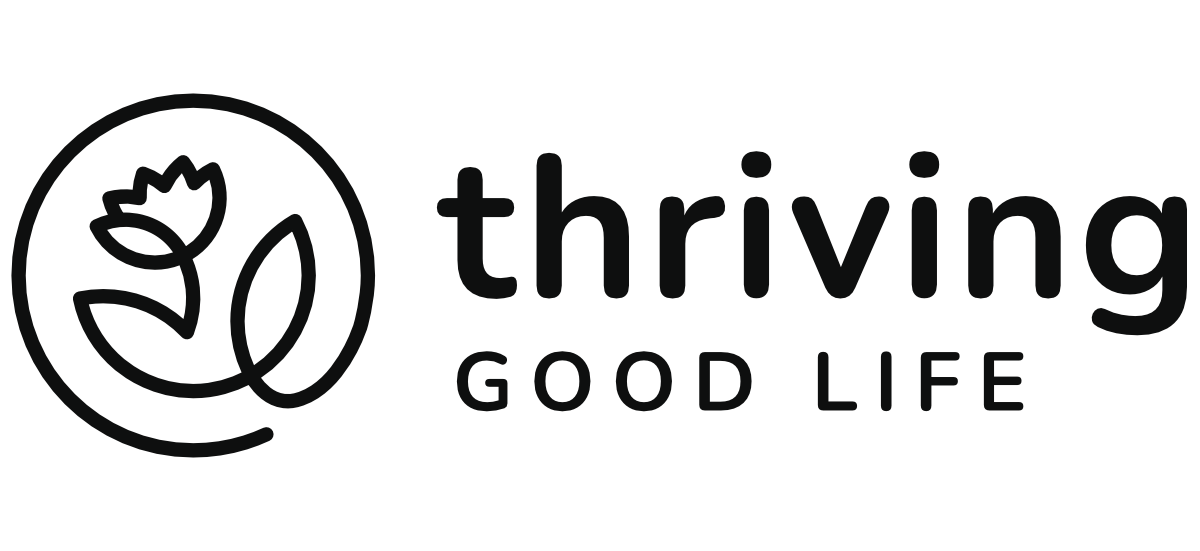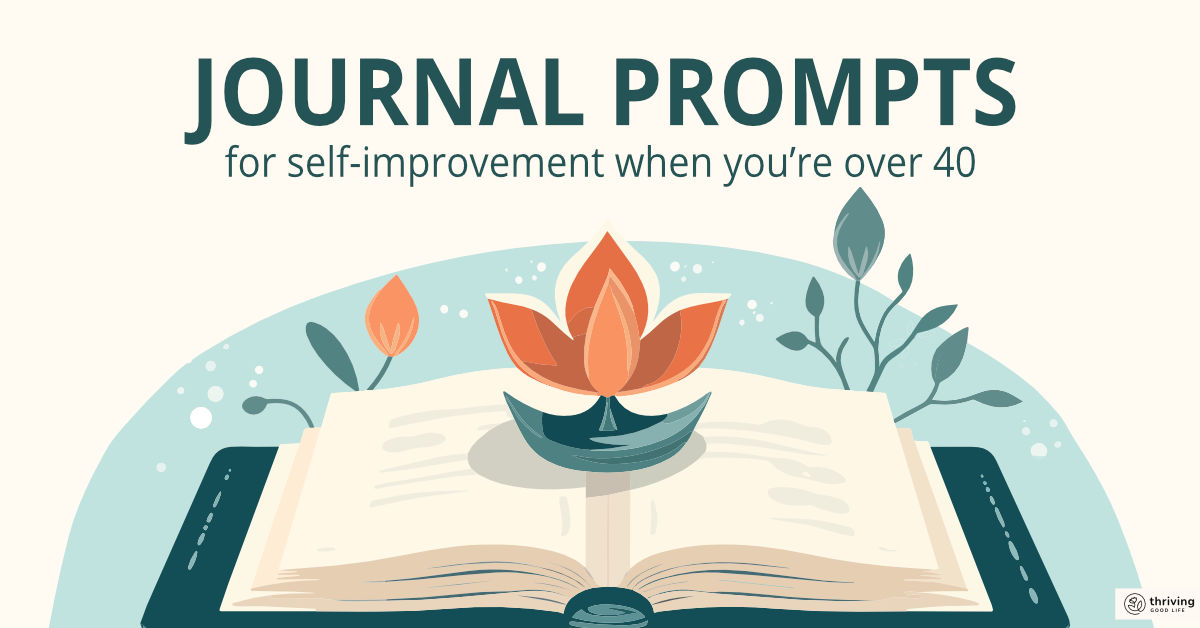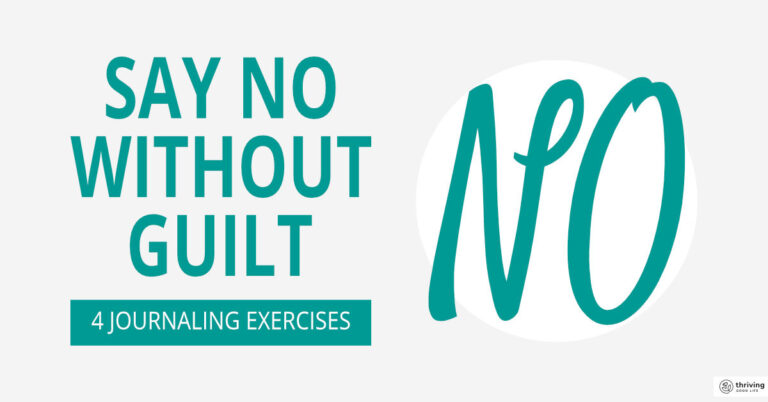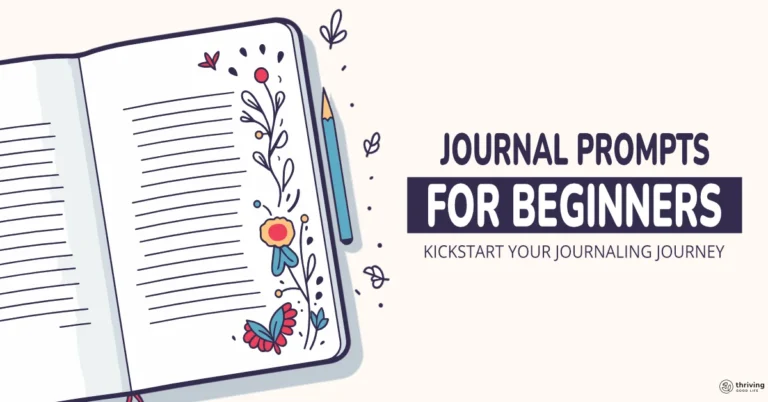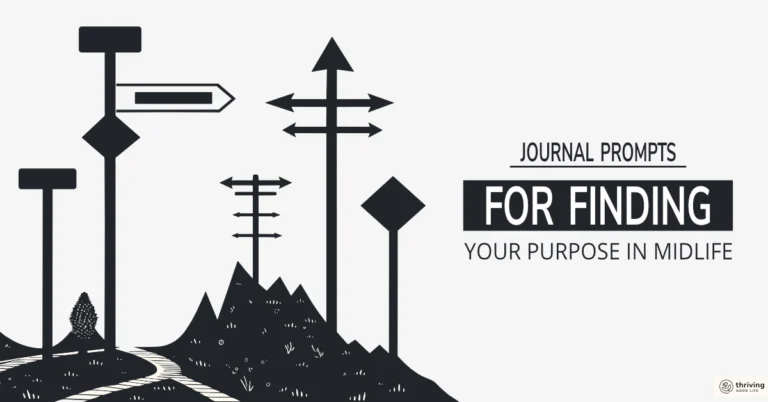📖 Journaling is a trusty sidekick for embracing midlife with a positive mindset. By asking the right journal prompts, we can recognise and appreciate the wisdom, experiences, and growth that comes with age.
Journaling for self-improvement when you’re over 40 hits differently.
We’ve lived through a few decades of ups, downs, and in-betweens.
We have a deeper understanding of ourselves now than we did in our 20s and 30s. And yet, that doesn’t mean we have everything figured out. Life’s still throwing big, meaty curveballs, and we’re still ducking, diving, swerving, and evolving.
But with great age, comes great stories, experiences, and insights. And we can tap into all of those by asking ourselves probing questions, and not shying away from the answers.
So, my plucky over-40-year-old, if you’re ready to embark on a journey of growth, I’ve created a list of 70 thought-provoking journal prompts for self-improvement. Prompts that will help you reflect on your priorities, life transitions, and growth as you continue to age gracefully.
Rules for Using These Prompts
Pfft. There are no rules. Pick and choose whichever prompt feels right for you, and the stage of life you’re at. Not every prompt has your name written on it, and that’s fine. Tweak, skip, or add variations.
OK, so I lied. There is one rule – be honest in your responses.
Journal Prompts for Goal Setting and Prioritising Your Life After 40
Chasing our dreams doesn’t have to stop as we enter our midlife phase. It’s actually the ideal time to ponder upon what truly counts and establish fresh goals for the next half of our lives.
1) In which areas of your life do you experience the most fulfillment, and how can you continue to build on these sources of satisfaction? What steps can you take to increase your sense of purpose and fulfillment in other areas of your life?
2) How do your current aspirations mesh with your long-term vision for your life, and how can you keep them on track as you grow and evolve? What can you do to make sure your goals are not only achievable but also deeply fulfilling to you?
3) What three things do you want to achieve in the next 10, 20, or 30 years, and how will you know you’re on track? What do you need to learn or improve on to reach these goals?
4) Think about one of your biggest goals. What potential hurdles, roadblocks, or distractions might you encounter in pursuing this goal? How do you plan on staying focused as you pursue this goal?
5) Do you have any dreams of leaving a legacy or making a lasting impact on the world? What are they? What action do you need to take to make sure your life’s journey positively impacts future generations?
Journal Prompts for Relationships and Communication for the Over 40s
Although it’s not an absolute truth in all cases, our character is often reflected in the relationships we keep with others. The more we become aware of our social interactions, the more we’re able to make conscious choices about our true desires and boundaries, as well as who we want, and don’t want, to spend time with.
1) How can you maintain strong, meaningful relationships with loved ones and friends as you grow older? What steps can you take to nurture these relationships and keep them strong and fulfilling?
2) Take a moment to think about significant relationships that have come to an end, whether through breakups or loss. What valuable lessons have you learned from each of these experiences, and how have they influenced your outlook on relationships as you’ve grown wiser? How have you coped with the absence of these people in your life?
3) How has your communication style evolved over the years, and how has it impacted your relationships? Have you found that you communicate differently with different people, or have you developed a consistent style over time? How have you worked to improve your communication skills as you’ve gotten older?
4) What role does compromise play in your relationships, and how has your approach to compromise changed over time? Have you found that you’re more or less willing to compromise as you’ve gotten older? How do you balance the need for compromise with the need to maintain healthy boundaries in your relationships?
5) How has your understanding of love and relationships changed over time, and what factors have contributed to these changes?
6) What continues to influence your current perspective on love and relationships? What valuable nuggets of wisdom have you learned/are still learning along the way?
7) Reflect on the relationships in your life that have brought you the most fulfillment. What made these relationships special, and how have they impacted your life?
8) How do you maintain and effectively communicate your need for healthy boundaries in your relationships? As your ability to hold boundaries changed as you’ve gotten older? In what ways?
9) How do you strike a balance between companionship and independence in your relationships, and how has this balance evolved over time? In the pursuit of maintaining your sense of self and independence, how do you simultaneously build and nurture close connections?
10) How have your relationship expectations changed as you’ve matured and gained wisdom? What factors have influenced these changes? How does this influence your approach to relationships now compared to your younger years?
11) How have your relationship priorities shifted as you’ve gotten older?
Journal Prompts for Navigating Career Changes in Your 40s and Older
It’s natural to start evaluating our career choices and want to make changes. Whether we’re feeling stuck in our current job or seeking a new challenge, this process can be both exciting and daunting.
1) Take a moment to look back on your professional journey so far. What valuable insights have you gained about yourself through your career experiences? How have these insights influenced the person you are today and the path you’ve chosen for your career?
2)
3) What drives your career choices? Are there certain values or principles that help you make decisions about your path? What are these? And how do you make sure your current career continues to align with what you truly believe in?
4) How do you balance the desire for financial stability with the need for personal fulfillment in your career? What adjustments have you made/do you make to maintain this balance?
10) How have your skills and strengths developed over the course of your career? What additional professional skills or strengths do you hope to develop in the future?
5) What steps do you take to make sure you’re continually growing and learning throughout your career? What resources have you found most helpful in your professional development?
6) What have been the biggest challenges in your career so far? What skills or strengths have helped you navigate these challenges? What lessons have you learned?
7) How have changes in your personal circumstances, such as becoming a parent or caregiver, influenced your career path and approach to work?
8) In what ways do you seek out and embrace new challenges and opportunities in your career or profession? Explore the moments when you’ve dared to pursue ambitious projects.
9) What factors do you consider when weighing up the risks and opportunities associated with changing careers? What strategies do you use to balance caution with boldness?
11) Reflecting on your past career transitions, what lessons have you learned along the way? How will you use these lessons to make informed decisions in your future career moves?
12) If you were to make a career change now, what would be the financial implications of that change? How would you plan for financial stability during the transition period?
Journal Prompts for Self-Care and Overall Well-Being in Midlife
It’s likely that you’ve spent a significant portion of your life taking care of the well-being of others. Time to contemplate what your mental, physical, emotional, and spiritual needs are.
1) Reflect on your self-care and wellness journey so far. What lessons have you learned about your own needs and priorities? How have these insights informed your approach to caring for yourself in your 40s?
2) Reflect on a time when you felt physically at your best. What habits or activities contributed to that feeling, and how can you incorporate them into your current routine?
3) Reflect on a time when you felt emotionally at your best. What factors contributed to that feeling, and how can you cultivate more of those factors in your life?
4) What role does spirituality or faith play in your life, and how do you nurture this aspect of yourself? This could be either a belief in God, the universe, or a general sense of there being a bigger purpose or meaning to life.
5) How do you manage and bounce back from setbacks, stress, or disappointments while keeping your mental and emotional well-being intact? What coping strategies, techniques, or resources have been invaluable to you during these times?
6) Amidst the whirlwind of demands and responsibilities that come with age, how do you carve out moments of tranquility, equilibrium, and contentment in your life? What practices or approaches have helped you maintain a sense of peace and balance throughout your journey?
7) How can you make self-care a priority and create more time for yourself? Think about practical steps you can take to ensure that self-care becomes a central part of your life. Explore strategies that resonate with you, like setting boundaries, scheduling dedicated “me” time, or incorporating activities that bring you joy and rejuvenation.
8) When it comes to your diet and nutrition, are there any changes you’ve noticed in your preferences or requirements as you’ve gotten older? How have you adapted your eating habits to cater to these changes?
9) How has your approach to exercise evolved since entering midlife and beyond? What types of physical activities do you find most enjoyable and beneficial at this stage of your life?
10) Take a moment to think about your sleep hygiene. Have you noticed any changes in your sleep quality or duration of sleep over the years? What effect do these changes have on you? What can you do (or currently do) to create a healthier sleep environment or routine?
11) Think about your relationships with the people in your life currently. What role do they play in your satisfaction and happiness, either positively or negatively? Explore what keeps you connected to these relationships. Additionally, explore what boundaries are necessary to protect your emotional well-being and support personal growth.
12) Have you faced any significant health challenges since entering midlife? If so, think back on your journey and the lessons you learned about self-care and overall well-being. How did you handle the healing process, and what valuable insights did you gain about prioritising your health?
13) How do you keep informed and take proactive steps to care for your health? Are there specific areas, like your physical well-being, mental sharpness, or social connections, that you find more challenging? Take a moment to reflect on how you stay on top of your health and identify any areas that require extra attention.
14) How do you maintain a healthy balance between digital screen time and your overall well-being and self-care practices? Reflect on your approach to managing technology in your life and consider the impact it has on your mental, emotional, and physical health.
Journal Prompts for Financial Planning and Security After the Age of 40
As we step into our over-40s life, our finances take on a new level of importance. Spend some time reflecting on where you’re at financially and where you’d like to or could be in the future.
1) What’s your definition of financial security? How can you achieve it? What benchmarks or milestones do you need to reach to feel financially secure?
2) How has your financial situation changed since you entered midlife? What factors have contributed to these changes?
3) Reflect on your current financial habits and routines. How do you prioritise your spending? Are there any areas where you should be spending more or less? What specific behaviours or practices would you like to change or build upon?
4) What are your biggest financial challenges right now? How can you overcome these challenges?
5) How do you maintain a balance between enjoying life in the present while also planning and saving for the future? What has been your biggest challenge in finding this balance? What steps can you take to make sure you’re prioritising both present enjoyment and future security?
6) What are your thoughts on debt and how do you manage to keep it in check?
7) How do you approach conversations about money and financial planning with family members or loved ones?
8) Reflect on a time when you experienced a significant financial setback. What lessons did you learn from this experience, and how have you applied those lessons to your current financial position?
9) How do you evaluate your financial decisions and assess their impact? What decision-making frameworks do you use to help you make sound financial decisions?
10) Reflect on your financial education and knowledge. Are there any areas where you’d like to improve your understanding or skills, such as investing, taxation, or estate planning? How can you improve your financial literacy? What books, courses, or resources can you use to educate yourself?
11) What do you want your retirement to look like? What type of lifestyle do you imagine for yourself? What steps can take to save and plan for a secure and comfortable retirement?
12) What are your aspirations for long-term financial success beyond retirement? Take a moment to envision your financial goals and dreams that extend beyond the retirement phase. Consider the lifestyle you desire, any legacy you wish to leave, and the financial security you aim to achieve. What steps you can take now to set yourself up for long-term financial well-being?
13) Reflect on your financial journey so far. What lessons or insights have you gained about your values, priorities, and strategies for achieving financial security in your 40s and beyond?
Journal Prompts for Personal Growth and Self-Acceptance for Over 40-Year-Olds
While significant life transitions can be challenging, they’re also transformative. That’s why practicing self-compassion for the over 40s is essential for maintaining a healthy outlook on life.
1) What defines success for you at this stage of life? Take into account various aspects of your life, including personal and professional fulfillment, well-being, family, and community involvement.
2) Reflect on the aspects of aging that you appreciate, such as increased self-awareness, stronger relationships, or newfound passions. How can you celebrate these accomplishments and use them to fuel your continued personal growth?
3) Reflect on your current biggest fears or limiting beliefs and compare them to the ones you had when you were younger. How have these fears or beliefs changed over time? What do you feel you have to overcome now, and how do you plan to tackle this?
4) How has age brought wisdom and clarity to your life? Share specific examples or insights.
5) How has your sense of ‘self’ evolved since your younger years? Think about your values, beliefs, and passions. Have you become more confident or self-assured? Have your beliefs or values shifted? Have new passions or interests emerged?
6) What have you found to be the most challenging aspects of aging? Are there specific areas, such as physical health, cognitive abilities, or social connections, that have been particularly difficult? What strategies, habits, or routines have helped you cope with these challenges?
7) How have your experiences with failure shaped your approach to challenges in your life?
8) As you grow older, what are some things you’ve struggled to accept? What can you do to move to a place where you find peace and self-acceptance with these?
9) How do you navigate significant changes in your relationships as you get older, such as empty nesting, evolving friendships, or changing family dynamics? What strategies or coping mechanisms have you found to be helpful in adapting to these new stages of life?
10) Think about a time when you went through a major change, like a change in living situation, physical health, a separation or divorce, or the loss of a loved one. Who or what has supported you in challenging times? Take a moment to think about the people, resources, or practices that have been instrumental in helping you manage challenging situations.
11) What does self-compassion look like for you? How do you speak to yourself in moments of self-doubt? How do you practice being kind and understanding towards yourself, especially during difficult times? What can you do to be even more loving and kind to yourself?
12) How do you maintain a sense of curiosity, enthusiasm, and openness to learning and new experiences as you get older? Are there any new activities or interests that you’d like to explore in the coming years?
13) How do you embrace change and find the courage to take risks or try new things? Explore the moments in your personal life when you’ve stepped outside your comfort zone, pushed your boundaries, and embarked on exciting adventures. Describe the growth you experienced.
14) Reflect on the aspects of your life that you’re grateful for, both big and small. How can you include a regular gratitude practice into your daily routine, and how might this shift your perspective on aging and the inevitable changes that come with it?
15) Reflect on your relationship with your body and physical appearance. How have your perceptions shifted over time, and how do you practice self-acceptance in this area?
